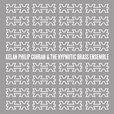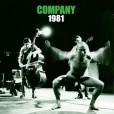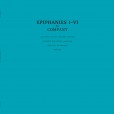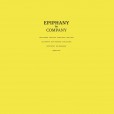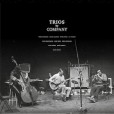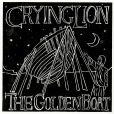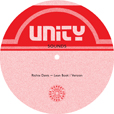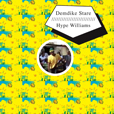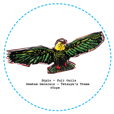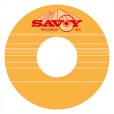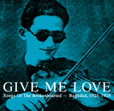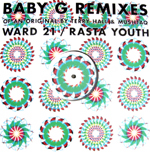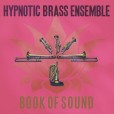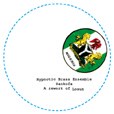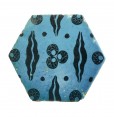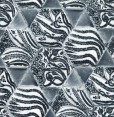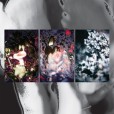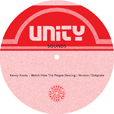Your basket is empty

With the Loose Lips MC in full flow, and complete with a Spinna house version. On percussion, Miguel Fuentes brings classic Philly vibes courtesy of the MFSB family.
Brand new recordings, this is majestic, surging, scintillating music — with swing, jump and shout, Sun Ra, Mingus and Gil Evans, Arab-Andalusian music, hip hop and New Orleans funk all coursing through.
Previously unreleased recordings by various lineups drawn from Derek Bailey, Tristan Honsinger, Christine Jeffrey, Toshinori Kondo, Charlie Morrow, David Toop, Maarten Altena, Georgie Born, Lindsay Cooper, Steve Lacy, Radu Malfatti and Jamie Muir.
Journalists often make the brief history of Free Improvisation conform to the idea that the history of music is a nice straight line from past to present: Beethoven… Brahms… Boulez. Thus Derek Bailey, Evan Parker and John Stevens — together with Brötzmann and co across the Channel — were the trailblazing ‘first generation’, forging a wholly new language alongside contemporary avant-garde and free jazz. Figures like Toshinori Kondo and David Toop, willing as they were to incorporate snippets of all kinds of music, were the pesky ‘second generation’, happily cocking a snook at the ‘ideological purity’ of Bailey’s non-idiomatic improvisation.
‘Company 1981’ shows up the foolishness — the wrongness — of such storylines. Check the eclectic collection of guests Bailey invited to Company Weeks over the years. He had clear ideas about the music, but he was no ideological purist.
One of the founders of Fluxus, Charlie Morrow injects blasts of Cageian fun into half the recordings here, whether blurting military fanfares from his trumpet, or intoning far-flung scraps of speech. Cellist Tristan Honsinger and vocalist Christine Jeffrey join in the joyful glossolalia, while Bailey, Toop and Kondo contribute delicious, delicate, hooligan arabesques, by turns.
The remainder are performed by a different ensemble: Bailey, bassist Maarten Altena, former Henry Cow members Georgie Born and Lindsay Cooper on cello and bassoon, the insanely inventive Jamie Muir on percussion, and trombonist Radu Malfatti, showing his mastery of extended technique. Were that not enough, there’s the inimitable purity of Steve Lacy’s soprano ringing high and clear above the melee. Glorious!
There’s always been this idea that Free Improvisation is somehow Difficult Listening, but when the doors of perception are thrown open and prejudice cast aside, you realise that it’s not difficult at all. “Is it that easy?” chirps Morrow, at one point. Indeed it is.
Enjoy yourself.
Derek Bailey’s guests for Company Week at London’s ICA in July 1982 were contemporary classical pianist Ursula Oppens, folk/jazz singer-turned-improviser Julie Tippetts and her partner pianist Keith Tippett, violinist/electronics wizard Philipp Wachsmann, guitarist Fred Frith, trombonist George Lewis, harpist Anne LeBaron, and from Japan free jazz bassist Motoharu Yoshizawa and sound artist Akio Suzuki.
Altogether they performed the stunning extended improvisation Epiphany.
In different, more intimate lineups they detonated numerous Epiphanies.
Here, to start, Yoshizawa and Oppens (both on the keyboard and inside her piano) bounce ideas off each other like ping-pong balls.
Then Tippetts, Wachsmann and Bailey do extraterrestrial cubist flamenco; and Lewis and Frith rumble at everyone magnificently.
Tippett and Oppens kaleidoscope the entire history of the piano into just over fifteen minutes (Fourth and Fifth) with added seasoning from LeBaron and Wachsmann.
To close, Akio Suzuki — despite once describing himself as “pursuing listening as a practice” — makes one hell of a racket with his self-made instruments: a flute, a spring gong and his analapos (two single-lidded cylinders attached by a long steel coil, which he can manipulate and strike, besides vocalising into the tube). Yoshizawa and Bailey give him a real run for his money, and it all builds to an ecstatic, swirling, grinding climax, with Suzuki whooping and hollering wildly.
Epiphany \ i-ˈpi-fə-nē \ (1) a manifestation of the essential nature of something (usually sudden) (2) an intuitive grasp of reality through something (usually simple and striking) (3) an illuminating discovery or disclosure.
All three definitions apply perfectly to this span of music recorded at London’s ICA in July 1982. It’s a miracle of group interaction, wonderfully paced, moving steadily between moments of mounting intensity and tension. The passage about halfway through — when Derek Bailey’s harmonics ring out above a sheen of inside piano tremolos and shimmering electronics, topped off by Julie Tippetts’ soaring vocalese — is simply sublime. After which it’s fun to try and tell the two pianists apart. Are those runs Ursula Oppens, with her formidable technique honed from years performing some of the twentieth century’s most difficult notated new music, or are those Keith Tippett’s crunchy jazz zigzags? Are those intriguing twangs from one of Akio Suzuki’s invented instruments or could they be Fred Frith’s or Phil Wachsmann’s electronics? Bah, who cares?
There’s plenty of room for the more delicate instruments too, like Anne LeBaron’s harp picking its way gingerly through a pin-cushion of pings and scratches from Bailey and bassist Motoharu Yoshizawa. Of course, some performers are instantly recognisable: Tippetts, as lyrical and flighty on flute as when she sings, Phil Wachsmann, sinuous and sensitive on violin, and trombonist George Lewis, who, as John Zorn once put it, swings his motherfucking ass off.
So many magical moments abound, from the opening dawn chorus of Tippetts’ voice and Frith’s guitar swooping through a rainforest of exquisite piano cascades, to the Zen calm of the closing moments.
Epiphany, indeed.
A typically eclectic collection of guests joined Derek Bailey for Company Week in 1983: saxophonists Evan Parker and Peter Brötzmann; cellist Ernst Reijseger, mainstay of Dutch new jazz (ICP Orchestra, Clusone Trio); American wind virtuoso J.D.Parran, veteran of the Black Artists’ Group and Anthony Davis and Anthony Braxton ensembles.
The French bassist Joëlle Léandre is equally at home playing free or performing works by Cage and Scelsi, while Vinko Globokar is an acclaimed composer as well as a trombonist of monstrous virtuosity.
British electronics pioneer Hugh Davies served time alongside Globokar with Karlheinz Stockhausen. Percussionist Jamie Muir was with Davies on the very first (Music Improvisation) Company outing in 1970, before a brief stint with King Crimson.
Is there an ideal number of musicians for free improvisation? Bailey once described playing solo as a “second-rate activity” – though he did it spectacularly well – while at the other end of the spectrum, large improvising ensembles can descend into an unwieldy racket.
Three may be a crowd for some, but for Pythagoras it was the perfect number, and trios work surprisingly well in improvised music. Sometimes one instrument takes centre stage, like Parker’s circular-breathing soprano at the beginning of Five, but knowing when to lie low, as he does in the brief austere Three, is just as crucial to the success of the whole. Muir makes sure he doesn’t get in the way of Globokar and Parran’s leisurely exchanges on Four, but the trombonist is all over the place on One, with Léandre racing up and down her bass and Davies all spikes, squeaks and squiggles.
With a touch of Bailey’s dry humour, two of these seven recordings aren’t trios at all: Trio Minus One is his duo with Reijseger, running the gamut from crazed polyrhythmic strumming (imagine Reinhardt and Grappelli playing Schoenberg and Nancarrow simultaneously) to what must be the fastest cello pizzicati ever recorded. And on the closing ecstatic nonet, Brötzmann and trumpeter John Corbett prove that more cooks don’t necessarily spoil the broth but sure as hell can spice it up.
Refreshing, rootedly odd, mostly unaccompanied four-part-harmony singing recorded in Govan Old Parish Church, Glasgow, by members of Trembling Bells and Muldoon’s Picnic. Elements of Sacred Harp, Gregorian chant, medieval madrigal and English folk, with poetic influences including Maya Deren, Saint John The Divine and Dennis Potter — a unique blend of the visionary and the earthly, the intimate and glorious.
Silk-screened sleeve.
‘If you are poor, you walk in your shoes, you lean.’ Three Unity revive 12s in today, remastered and in spanking new sleeves. Altogether, as a label, the greatest UK digi there ever was.
Diplo / Newham Generals / Elewedu Of Agege
Fuji Ouija / Tetsuya's Theme / Dance / Thank You
Honest Jon's Records
A Lagos fuji session sets Diplo tearing up walls and stomping across the ceiling; a fragment of afro-folk percussion triggers the Generals’ brilliant futurism; and two sumptuous cuts of the original deal.
Precious, timely, moody reflections on migrating from Côte d’Ivoire to Moss, in Norway, over ruff breakbeat funk supplied by the nimble bass-playing of Maimouna’s old man (from Kambo Super Sound), and the expert conga and kit-drumming of Stliletti-Ana (from Jesse, in Helsinki). Even in their delirium, b-boys and girls will savour traces of the Incredible Bongo Band, in the chorus. Over the eight minutes, and going deeper on the flip, the mix lifts off into a cosmic steppers dub, featuring Gilb-r alongside Sotofett on keyboards, with no let up for the dancefloor in energy and vibes.
“It was in 2001 / I got the letter / A letter that said / I would travel to a cold world / Not knowing what would happen / I was full of loneliness / No country / Everyone was different / Not only skin colour / The way people spoke / The way people behaved / That’s the adventure / Obey / This is the story we’re told / The key to success / So we can do everything for our parents / Who need us / Desperate for a better life / That’s the adventure.”
Three knockout EPs, in hand-stamped, poly-lined sleeves.
Hebi is tough, stomping, mesmerizing romany funk, riding Far East from the Baltic Sea on clopping hooves of uranium, with synths from spaceways further out still. Weakheart deejays will scatter, but Sotofett has road-tested this on dubplate for six months, tearing up parties and dancefloors.
Deeply meditative, desolately beautiful, Haru will stop you in your tracks. Osaruxo’s violin could be a rebab or a shamisen, a reed instrument or a voice. Ravishing music.
Red hot gospel soul from 1983. Only ever issued as a test white-label; never before released commercially.
Plus some classic early-eighties soul vibes on the flip, as Helen Hollins — from James Cleveland’s Southern California Community Choir— magnificently busts loose Burt Bacharach, strutting resplendently onto the dancefloor with her dad, husband and two daughters Alicia and Francheasca in glorious cahoots.
Lovely spot-glossed sleeve.
Devilishly limited, all three of our Savoy singles.
Cold-sweat compounds of art-funk, baglama high-life, horrorama, yacht.
‘Beautiful, haunting… spiritual reflection is sung with carnal force, songs of romance are rendered like hymns. For a few moments, on these ancient records, Baghdad sounds like paradise’ (Rolling Stone).
Rough, tough, tumping, bumping soundboy breakbeat from the Caribbean coast of Colombia.
Forty brand new buckaroos, tooled and primed by Jeanpi Perreo, Edwin Producciones and DJ Ander — all from local sound-systems — careering guarapo-style out of punches of vintage Nigerian highlife, waka and co, by legends like Steven Amechi, Sagbeni Aragbada and Cardinal Rex Jim Lawson.
Edited and mastered by CGB at D&M for maximum oomph and worries, and presented in a gatefold sleeve with cool and deadly varnishing. Plus a full-size booklet detailing the fascinating history of this music, seamed into the strange, tentacular byways of hand-to-hand vinyl distribution, record collecting and musical connoisseurship, and the soundclash traditions of the region, suffused with the politics and culture of the Black Atlantic, stretching back to the 1950s.
The second son of King Jammy, Trevor James aka Baby G is at the cutting edge of the new wave of dancehall producers. Jammy’s stalwarts Ward 21 and newcomers Rasta Youth on the mic.
“We started with a cosmic idea that we were taught from a very young age – that the stars and planets make a sound, that deep in outer space there is audible harmony.”
Book Of Sound is the brilliant, richly resonant exploration of these interstellar low ways. By turns urgent and contemplative, funky and reflective; varied in its textures, but entirely of one piece. Underpinned by cosmology, held in place by meditation, swirling with notions of history, science, theology, ancestry — this is a heady conceptual brew. But the music speaks loudest: ‘the sound of surprise’, magnificently retrieving Spiritual Jazz from the knacker’s yard.
It’s a deeply Chicagoan record. “It’s got the vibe of the lake,’ continues trombonist Cid, “the vibe of the prairies opening up to the west.” Also the Sun Ra albums recorded there in the 1950s, and — of course, being the dad of all seven ensemblists — Phil Cohran’s wonderful albums from the 1960s.
“You know, it’s tough trying to satisfy everybody with our music. It’s hard enough satisfying ourselves, let alone the jazz scene, the hip hop guys, what have you. With this album we just dropped all that as a consideration, and tuned into deeper principles.”
Tear-up bad-boy brass-band scorchers. Just like dad crossed Sun Ra with Kool And The Gang, this crashes funkdafied New Orleans street jazz into hip hop. With Flea, Damon, Tony Allen, Malcolm from The Heliocentrics.
‘Since the 16th century, the Ecuadorian province of Esmeraldas has been home to a unique Afro-Indigenous culture originating in the integration of the Indigenous Chachi and Nigua peoples with African Maroon communities. Juyungo documents significant Esmeraldan artists and bands playing the Afro-Ecuadorian folklore of the province, as well as including some older field recordings. Based mostly on the marimba, whose origins lie partly in the African balafon, partly in Indigenous percussion instruments, the music is laced with call and response chants, ambient insect and bird noise, the filigree finger-styles of the Andean guitar tradition and the panpipes of the mountains. This is resonant insider roots music at its headiest — the mystic revelation of Esmeraldas, gully deep and lustral.’ Francis Gooding, The Wire.
The fifth in our series of LPs compiling classic music from Ecuador. Customary Honest Jons runnings: a beautiful gatefold sleeve; superior pressing, with vivid, intimate sound; full-size, sixteen-page booklet, in colour throughout, with detailed, fascinating, bi-lingual notes, and stunning photographs.
The music is transfixing, magical; not like anything else. From start to finish, this album is continuously, profoundly immersive; a kind of journeying, trippy meditation about slavery and cultural resistance, identity and mix, places and spaces, futures and pasts. It’s inscrutable to net-surfing, algorithms, Shuffle. But for a taste try the insurgent marimba roller Agua Largo, jet-propelled by Rosa Huila’s rapturous blend of African spiritualist and Christian chant. ‘Healing music,’ Zakia called it on Gilles Peterson’s BBC show recently. And the ravishing pasillo Kasilla Shungulla — ‘calm your heart’ in the Quichua language — a duet between the Peruvian master-guitarist Raúl García Zárate and viola da gamba by Juan Luis Restrepo from Medellin, recorded in a baroque church in Buzbanza, Colombia.
Pure worries from Leipzig — three club burners steeped in Detroit traditions, distilling the explorations in collective, nervy hypnosis of KM live sets. As the music slowly unfurls, there he is at every turn, subtly tweaking its parameters, redistributing its weight, pricking its grooves into a state of utterly infectious perpetual movement.
The two visions of Chilazon track opposite pathways: the first is twelve minutes of gorgeous, dubwise, aquatic techno, spattered with kicks and razor-sharp hi-hats, and smeared with ghostly echoes; then a terse mesh of broken drums, escalating to a quiet yet feverishly intense peak. Lanthanum is calligraphic swordplay, its toms and bass stabs warily circling one another in a graceful steppers’ dance, spaced-out and fathoms-deep.
Fierce, subtle music, radically strange and unafraid of the deep, but with a killer understanding of rhythm. Lush drum-machine nocturnes, gnarly electronica and glorious flowerings of zoned-out dubspace: an evolutionary music, continuously engaged with experimentation both in the studio and the club.
Whether prepared solo, or jointly with his spar Mix Mup, a Kassem Mosse recording is less of a stand-alone creation than the next thrilling installment of an unstoppable groove. True to form, Disclosure dazzlingly extends some of the most mystical, essential dancefloor-rooted music of the last decade, from dusty, dream-state techno on Workshop and Mikrodisko, to frazzled beatdowns on Trilogy Tapes and Nonplus.
Pedigree techno and house are the lifeblood of Disclosure, yet with something newly microscopic about them. Its mesmerising juggle of pointillistic percussion, melting-wax chords and fleshy bump’n’grind suggests biological processes at work, as if Mosse has zoomed right into the cellular metabolism ticking away at the core of the music.
These textures are woven into some of KM’s richest and most emotionally complex material so far, constantly enlivened by forays into jazz, dub and beyond. Check the farty-bottom, broken-down, steel-pan minimalism of Collapsing Dual Core, just the job for coursing around Detroit in a car at night; and Phoenicia Wireless’ dastardly, intricate combination of glowering John Carpenter synths, heavy static and junked consoles on remote, as if the beats are fighting a wave of dirt, soot and fossilisation. The frantic, interstella tarantella of Galaxy Series 7; the wonky bump-and-hustle and heavy-lidded drama of Purple Graphene, to close.
Expertly pieced-together and paced, Disclosure brilliantly registers all the self-contained coherence and artistic authority of an album proper, yet shadowed throughout by the open-ended and questing spirit so vital to Mosse’s music. Its intimate enactments of non-closure, and its sense that anything could happen at any moment; its thematic play between excess and incompleteness, babble and tongue-tied stutter, and-you-don’t-stop grooving and entropy, wobble and the pause-button.
Trash and ready in a spiffy Bankhead sleeve, too.
Double bim. Bim, bim.

